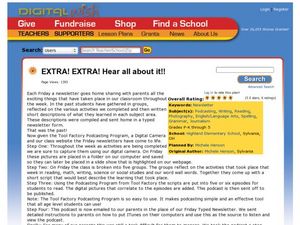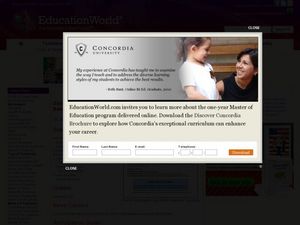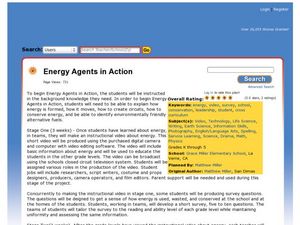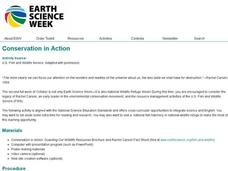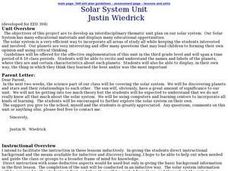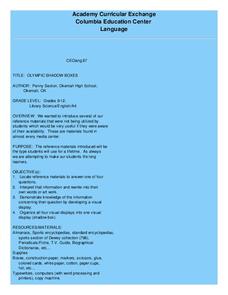National Wildlife Federation
Green Green Revolution
School budgets don't have a lot of extra money, so when students propose saving the district money, everyone jumps on board. The first lesson in the series of 21 introduces the concept of an energy audit. Scholars form an eco-action team...
Code.org
Minecraft Hour of Code
Devote an hour to computer coding ... it's time well spent! The activity has young computer scientists write code to solve puzzles in the Minecraft game. They learn how to apply block codes and repeat loops.
Curated OER
Student News And Weather Channel
Fabulous! Your 5th graders should love this project. As an ongoing lesson throughout the year students use temperature probes to record outside temperature and then document their data using spreadsheets. They use their weather data and...
Curated OER
Spring Time Trees/Flowers
Plan ahead! Integrate science and language arts! Schedule your reading of C.S. Lewis’ The Lion, the Witch, and The Wardrobe to coincide with the arrival of spring. As pupils read Chapter 11 of the Lewis classic, they are assigned one of...
Curated OER
Nature's Recycling Program
Students identify what materials make up compost. In this science of recycling lesson, students explain the benefits of composting determine how compost is a good plant fertilizer.
Curated OER
In The Zone
Third graders identify ways that ocean animals grow, survive, reproduce, and adapt. They use computer Internet skills to acces and collect information. They create a PowerPoint presentation. They demonstrate writing skills throughthe...
Curated OER
Observing and Sketching the Lunar Surface
Students explore space science by conducting an illustration activity. In this lunar lesson plan, students discuss what the moon is and the role it plays for our environment on Earth. Students view images of the moon and utilize chalk to...
Curated OER
Animal Habitats: 1st Grade
Learning about animal habitats can be a lot of fun. This lesson focuses on how God created different habitats to suit different animal needs. Students will conduct library research in order to create a five page habitat slide show using...
Curated OER
WEAVING TECHNOLOGY INTO THEMATIC UNITS T.O.O.L.S. 2000
Third graders utilize computers and other technology to explain the solar system. Ten different stations involve students through laserdisc, research, art, GeoSafari, space toys, and the computer.
Curated OER
Extra! Extra! Hear All About It!
Students summarize their weekly class activities by writing a newsletter. In this journalism activity, students create a multimedia presentation for their parents based on the classroom events that took place during the week....
Curated OER
Ocean Exhibits
Ninth graders create an ocean museum. They work in partners to create their own exhibit. Each exhibit must have an interactive computer placard containing their information. The exhibits must also have a hands-on component.
Curated OER
Summer Camp in the Classroom
Students explore wildlife plants and summer activities. For this natural science lesson, students identify plants and animals and create a scrapbook of their findings.
Curated OER
Animal Story: An Informational Narrative
Students use the computer to research information and publish creative narrative stories about the life of a specific Everglades animal. This lesson uses many educational, computer programs including the iLife suite, publishing...
Curated OER
Zoo Welcomes Baby Animals
Students engage in activities to gain a better understanding of endangered animals. In these animal lessons, students use vocabulary and comprehension skills to gain a better understanding of endangered animals. They also watch video...
Curated OER
Energy Agents in Action
Students share information about energy use and conservation. In this energy use lesson, students work as a production team to make an instructional video about basic energy information. They develop a short survey about energy use that...
Curated OER
The Buzz about the Buzz
Students examine the content of popular energy drinks by conducting research about stimulants and sweeteners. They create posters outlining how these compounds affect consumers. They compare and contrast energy drinks with soft drinks...
Curated OER
Conservation in Action
Students research the life and works of Rachel Carson. In this conservation lesson, students discuss environmental protection and why protection of wildlife is important. Students read a Rachel Carson Fact Sheet and work in groups...
Curated OER
Then and Now. Public Health from 1900 to Today
Young scholars analyze public health issues. For this public health lesson, students research Internet and print sources regarding the health concerns and diseases of the 20th and 21st centuries. Young scholars also interview...
Curated OER
Solar System Unit
Students probe an interdisciplinary unit on our solar system. Distances between planets, their characteristics, and applications to student's personal lives are analyzed in this experience. The unit contains seven lessons.
Curated OER
OLYMPIC SHADOW BOXES
Students acquaint themselves with little-used library resources/reference materials and create shadow boxes to be displayed in the Media Center based on the research they've done regarding the Winter Olympics.
Curated OER
WEAVING TECHNOLOGY INTO THEMATIC UNITS
Fourth graders explore the planets by researching and writing a report about one of the nine planets.
Thirteen Ed Online
What is Conceptual Art?
Research, art history, and web page creation! Sounds too good to be true. With tons of links and resources, the instructional activity provides you with everything needed to engage the class in an amazing art and research activity. They...
Curated OER
Sonnet Project
Twelfth graders use the internet to examine how the Gutenberg press affected society as a whole. Using examples of illuminated type, they develop type in three different formats. They share their types with the class and answer...
Curated OER
Getting the Word Out: From Gutenberg's Press to Zines
Students examine the effects of Gutenberg's printing press on the world. Using this information, they create their own Zines or internet magazines about a social issue of their choice. They share their magazine with the class for...








